How Israeli Incitement Against Palestinian Olive Pickers Is Escalating
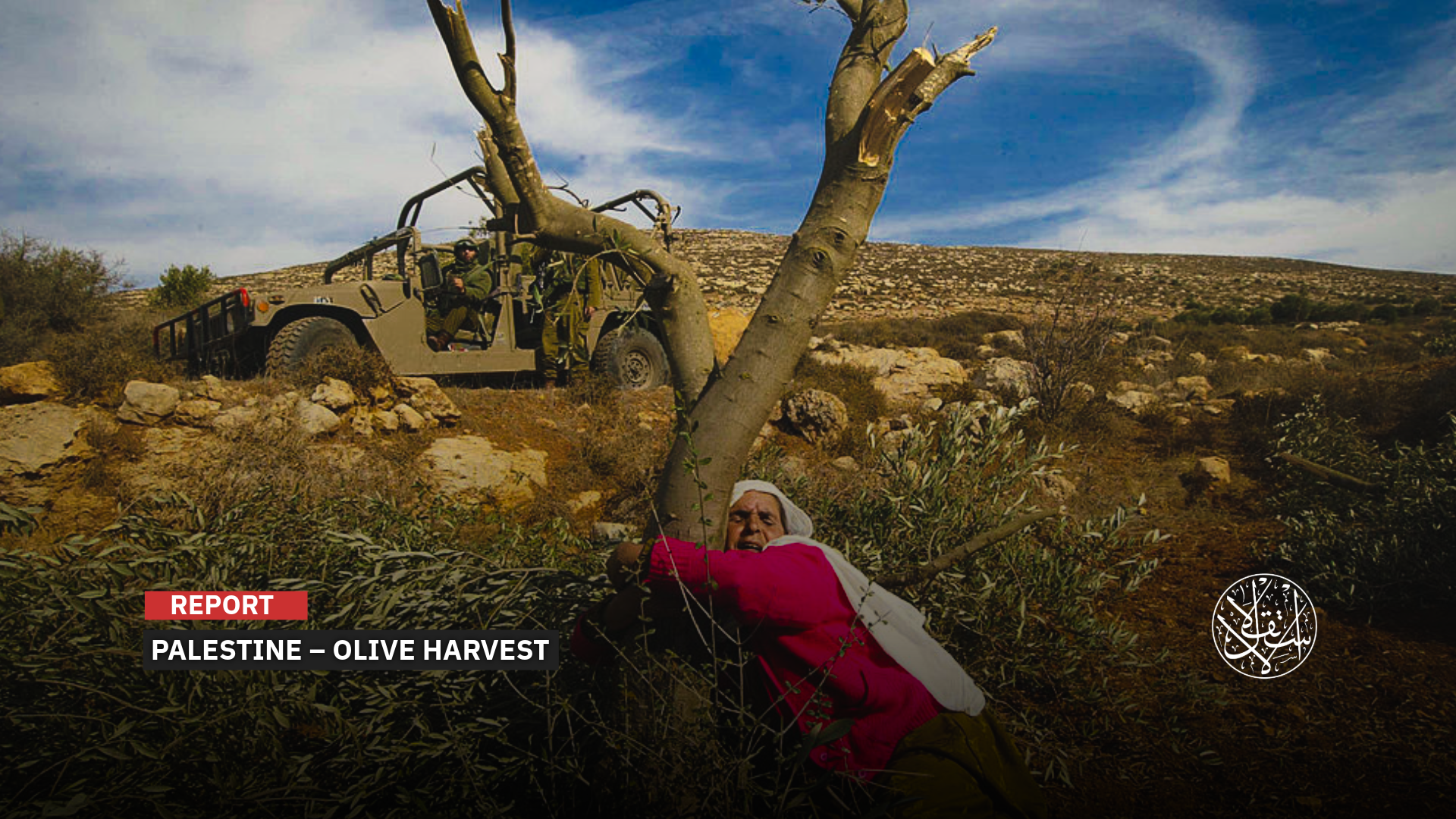
“Israel’s genocide has destroyed 80% of Gaza’s olive trees.”
The suffering of Palestinians under Israeli occupation continues, from Gaza to the occupied West Bank, which has witnessed a surge in attacks by Israeli settlers against Palestinian farmers during the current olive harvest season.
The first week of the olive harvest in October saw more than 150 attacks by settlers, and more than 700 olive trees were uprooted, broken or poisoned, according to the Associated Press.
In the new Israeli narrative, the olive tree becomes a security pretext for completing the project of controlling the land and expanding settlements in the West Bank under the guise of combating terrorism.
Olive Harvest
A Palestinian report issued by the Applied Research Institute – Jerusalem (ARIJ) on October 30 stated that Israeli authorities prevented the harvesting of olives on more than 25,000 dunams in the occupied West Bank during the current harvest season, which began at the start of last month.
It noted that the most targeted areas were the governorates of Jenin, Jerusalem, Qalqilya, and Ramallah, respectively.
Since the beginning of this year, the institute has documented more than 3,100 attacks carried out by settlers against Palestinians, their property, agricultural lands, and natural resources, causing significant damage.
According to field estimates and data from the Palestinian Ministry of Agriculture, the current season is the weakest in recent decades, with production not exceeding 15% of the normal average.
The UN Human Rights Office recorded 757 attacks by settlers during the first half of 2025, resulting in injuries or damage to agricultural property.
Today, nearly half of the agricultural land in the occupied Palestinian territories is used for olive cultivation.
As the most valuable crop in Palestine, seasonal olive exports inject nearly $200 million into the Palestinian economy annually, according to a report by the Palestinian Trade Center.
Around 100,000 families in the occupied West Bank rely on income from the olive harvest, according to UN figures, including about 15% of working women.
Olives are the backbone of the Palestinian agricultural sector. The Palestinian Authority's Ministry of Agriculture says they contribute about 8% to the GDP and provide more than 60,000 jobs, according to Reuters.
Besides being a form of agriculture that dates back centuries, the importance of olive cultivation for Palestinians runs much deeper.
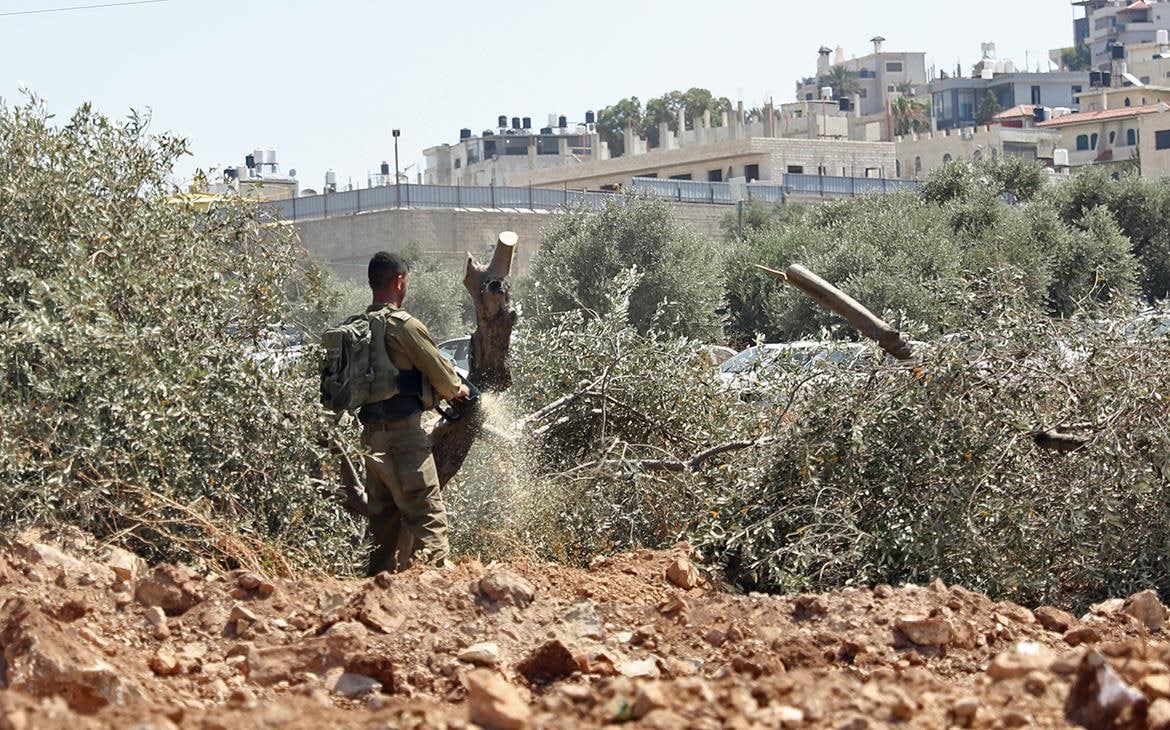
Harassment and Violence
Palestinian agriculture, including olive groves, has long been attacked by Zionist settler groups since the British mandate that predated the founding of “Israel”.
It is now estimated that 700,000 Israeli settlers live in 150 settlements and 200 outposts in the West Bank.
In the years leading up to the Israeli offensive on October 7, 2023, violence against Palestinian olive farmers increased as tensions escalated in the West Bank.
In 2020, for example, nearly 40% of Palestinian olive farmers reported that their crops had been stolen or damaged by Israeli settlers the previous year, while others experienced harassment and violence during the harvest season.
In 2023, violence in the West Bank escalated, with widespread reports of crop burning and physical assaults on Palestinian farmers.
On at least 38 occasions, eyewitnesses reported that the Israeli army assisted the attackers, according to the UN Office for the Coordination of Humanitarian Affairs (OCHA).
After October 7, 2023, the Israeli army repeatedly refused to grant Palestinian farmers permission to harvest olives.
As a result, approximately 20% of the olive crop in the West Bank went unharvested that year due to the difficulty of accessing the fields, and Palestinian farmers suffered losses estimated at $10 million.
In 2024, attacks by Israeli settlers increased, with nearly 200 incidents recorded – more than double the total for the previous year.
In August, the Israeli army destroyed 10,000 olive trees during a three-day siege of the West Bank Palestinian village of Al Mughayyir. Some of the trees were over a century old.
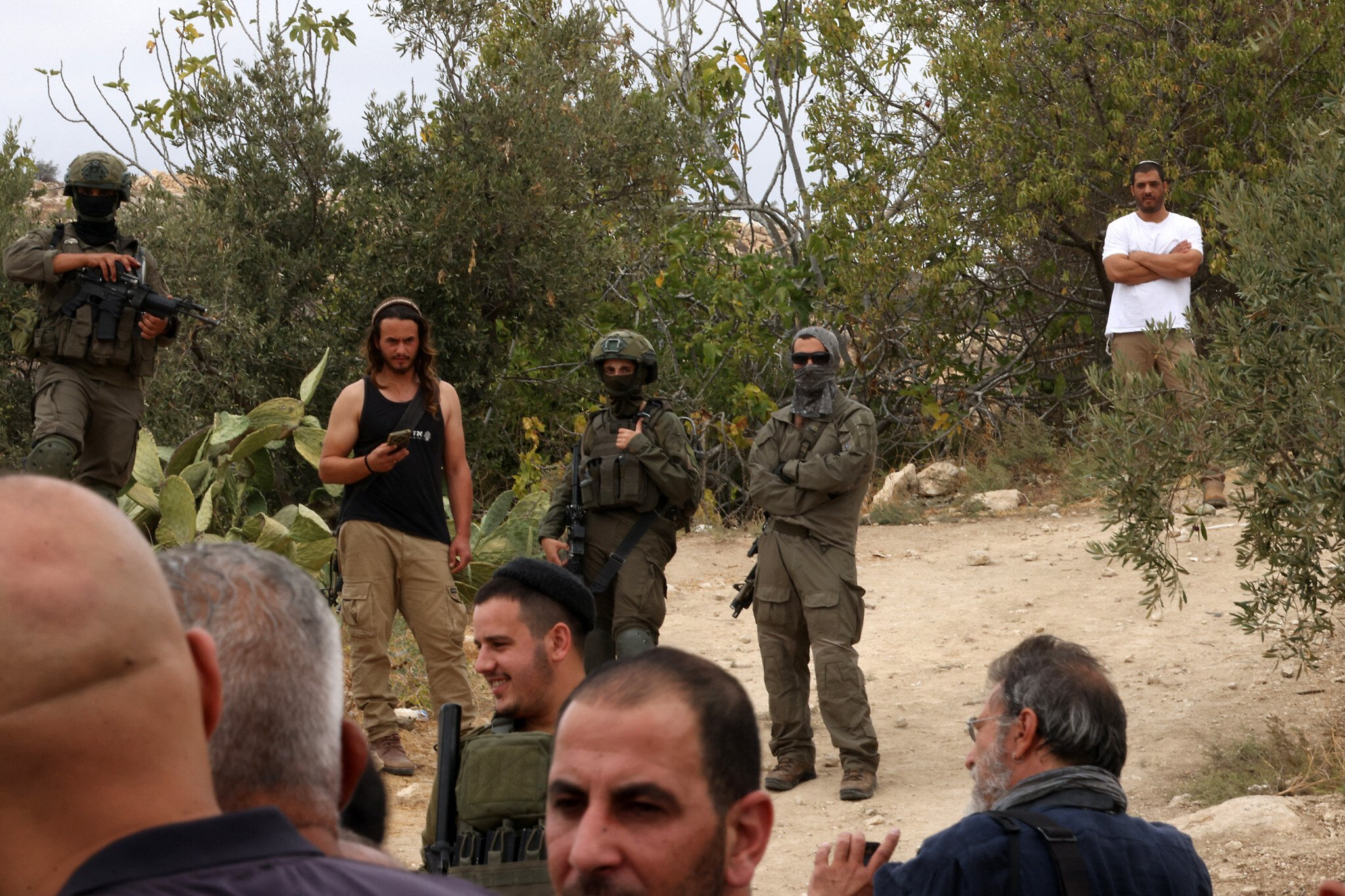
Settlement Plans
Before the war, Gaza had around 50,000 dunams planted with olive trees, producing more than 35,000 tonnes of olives annually from more than 1.1 million trees.
But after two years of continuous aggression, the cultivated area has shrunk to only about 4,000 dunams, after about 75% of the trees were destroyed or burned, according to the Ministry of Agriculture in Gaza.
In August, an assessment by the UN Food and Agriculture Organization (FAO) showed that 98.5% of agricultural land was damaged or rendered inaccessible by Israeli bombing.
The UN-backed World Hunger Monitoring Programme also announced that more than half a million people in Gaza are facing famine.
The FAO estimates that 86% of Gaza’s agricultural wells will have been destroyed by July 2025.
The Al Mezan Center for Human Rights accused “Israel” of committing environmental genocide in the Gaza Strip, stating in its October 2024 report that there is a risk of Gaza becoming completely uninhabitable.
A significant portion of the infrastructure associated with olive cultivation in Gaza, including olive presses, has also been destroyed.
“Israel” has imposed severe restrictions on olive exports since the decades-long blockade of Gaza, and these exports have ceased entirely amid the devastation of the past two years.
Attacks by settlers and Israeli occupation forces on olive trees are part of a broader assault on the lives of Palestinians in the occupied West Bank.
This policy aims to deprive Palestinians of income and force communities to leave their land through intimidation.
Since Benjamin Netanyahu’s extremist government took office, the Israeli right wing has been working to expand its settlement plans, including its declared intention to annex the occupied West Bank.
According to Haaretz, Israeli military commander Avi Bluth said that uprooting trees is intended to deter anyone who tries to attack settlers, adding that “every village should know that if it carries out any attack, it will pay a heavy price.”
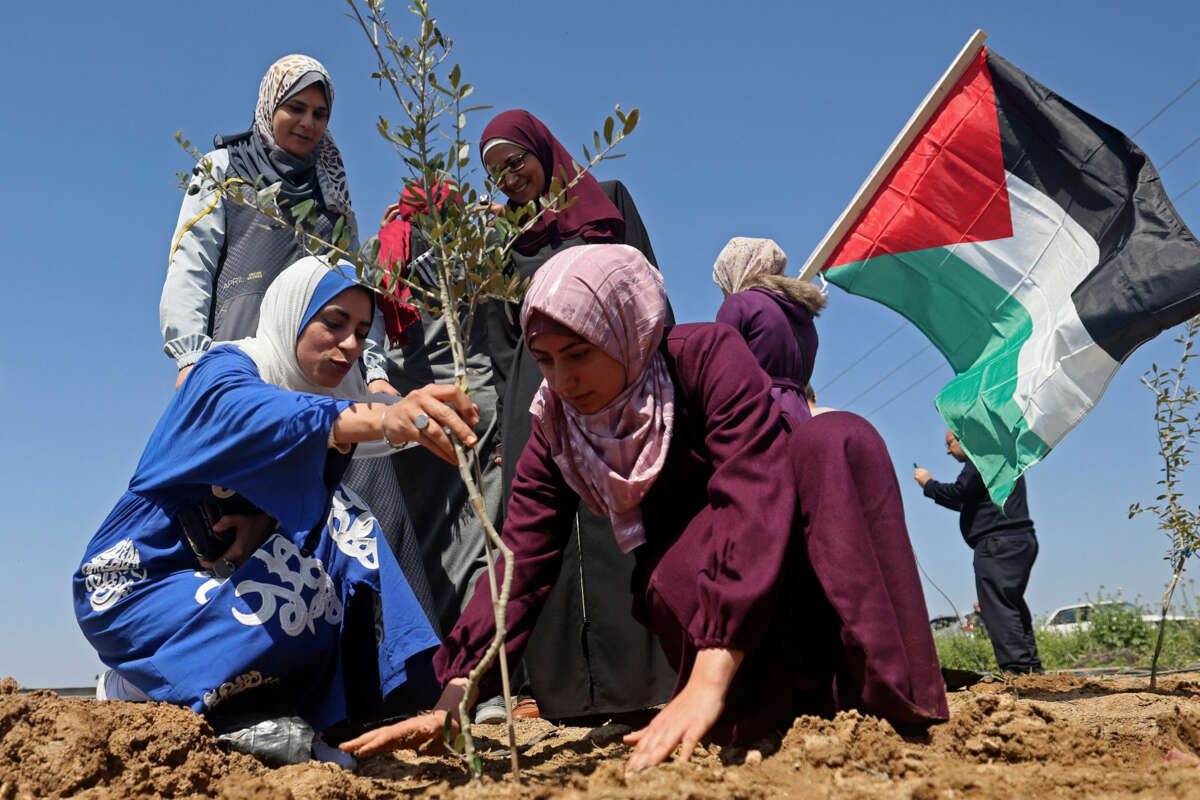
Israeli Incitement
The olive harvest season in Palestine coincides annually with an escalation of incitement campaigns against Palestinian farmers, turning this occasion into an arena for media and on-the-ground confrontations.
Israeli attacks are not limited to the land; they extend to the digital sphere, where Israeli accounts and platforms produce organized content aimed at delegitimizing Palestinian farmers and portraying their activities as a security threat or an infringement on private property.
An analysis by the Misbar fact-checking website reveals that this incitement, in which Israeli right-wing groups participate, coincided with the dissemination of misleading claims and videos.
Most notably, on October 20, Israeli accounts published a video claiming that Palestinian Authority rioters had attempted to storm settlement land near the village of al-Nazla al-Sharqiya, north of Tulkarm.
However, sources confirmed that the event was an official olive harvest organized by the Wall and Settlement Resistance Commission, the Tulkarm Governorate, the Ministry of Agriculture, and the local council, as part of the 2025 olive campaign.
In a related context, Palestinian media outlets documented numerous attacks in the occupied West Bank, including the firing of live ammunition and tear gas at farmers and solidarity activists in Bethlehem, Hebron, and Tulkarm.
Tulkarm Deputy Governor Faisal Salameh confirmed that these attacks are repeated annually to prevent Palestinians from harvesting their crops and to impose new settlement realities.
Misbar has repeatedly refuted Israeli claims that the olive harvest season poses a security threat. The most recent of these claims came from publications by the far-right Im Tirtzu movement, which called for the cancellation of the harvest in areas near settlements, arguing that Palestinians exploit it to carry out terrorist attacks.
The far-right movement also published digital petitions and banners warning of an impending massacre, directly linking agricultural activity to military confrontation.
The Israeli incitement campaigns continued with accusations targeting the Wall and Settlement Resistance Commission itself.
Israeli accounts claimed that the Commission stirs up tension and moves between Palestinian villages to confront the army and settlers, a claim Misbar refuted after monitoring its official activities.
An Israeli Channel 14 report claimed that the olive harvest season is being exploited by Palestinian activists to approach settlements using violent methods.
This is a recurring media narrative that attempts to portray Palestinian agricultural activity as a cover for security operations.
However, official field data tells a completely different story. The Wall and Settlement Resistance Commission documented more than 259 attacks against olive harvesters between October 1 and 28, 218 of which were carried out by settlers and 41 by the Israeli army.
It also recorded 125 attacks on cultivated land, including the cutting down and bulldozing of more than 1,070 olive trees.
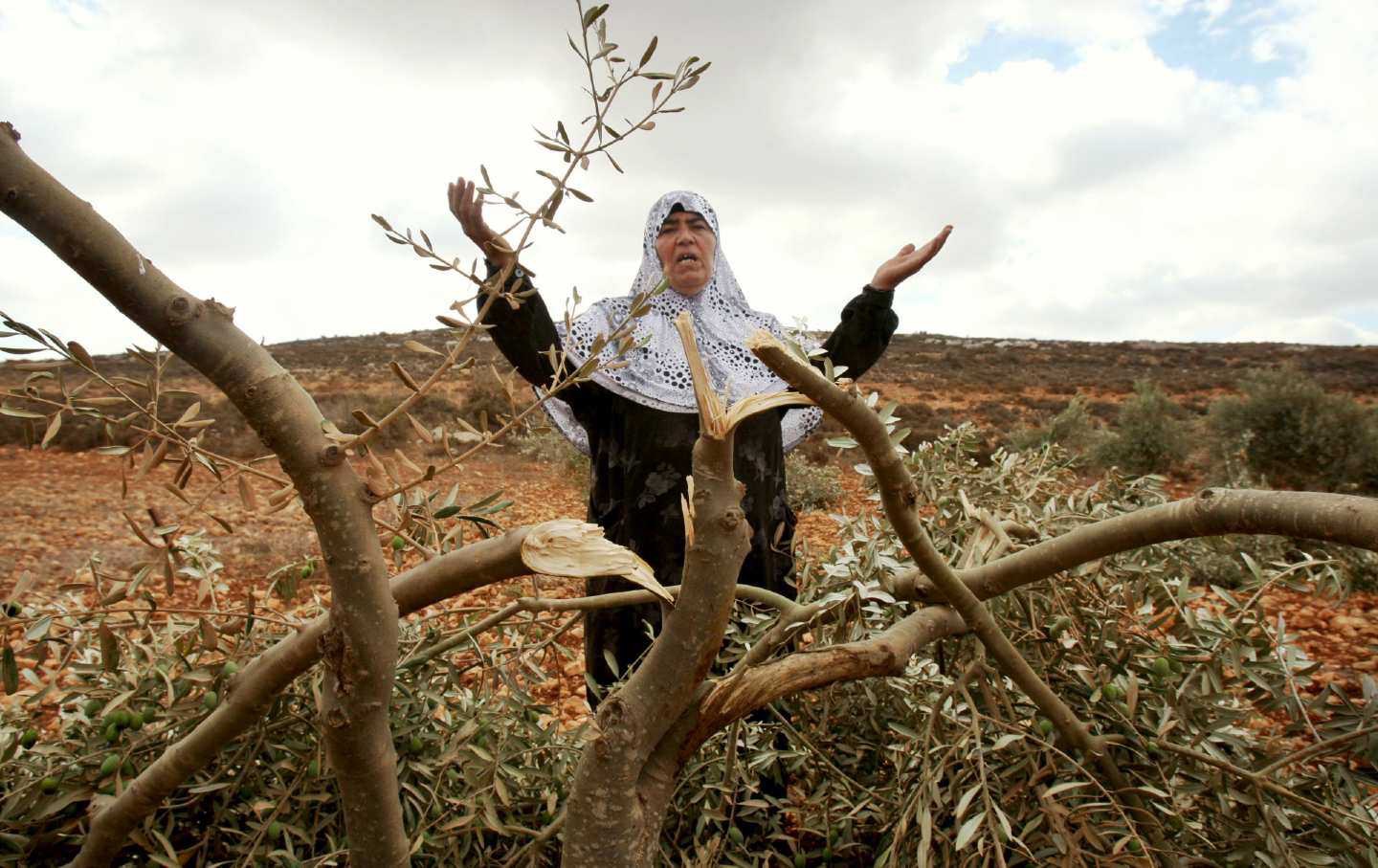
For his part, Palestinian journalist Iyad Hamad explained to Al-Estiklal that “the olive harvest is a social and spiritual ritual and an integral part of Palestinian heritage.”
“Beyond its symbolic significance, olives are a vital source of income for thousands of Palestinians, and small farmers depend on them to cover their daily living expenses,” he said.
He noted that “attacks on the olive harvest threaten the very way of life for many Palestinians and further deepen the coercive environment in the occupied West Bank and Gaza.”
Sources
- ‘Olives are everything for us’: West Bank farmers prevented from harvesting by settler violence
- Israel’s genocide has also destroyed 80% of Gaza’s olive trees [Analysis]
- UN Human Rights Office on the olive harvest season in the OPT
- Some IDF Tanks Are Out of Commission, and Germany's Weapons Embargo Could Impair Israel's Gaza Takeover Plan [Analysis]
- Israeli settlers beat Palestinian farmers on video as attacks mount during West Bank olive harvest
- 2024 Olive Harvest: Protection Response
- Israeli rhetoric and the reframing of the olive harvest season as an alleged security threat [Arabic]










